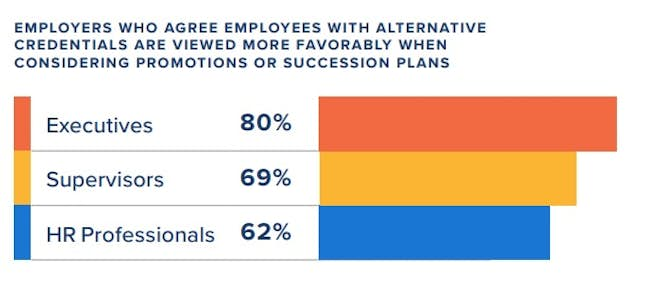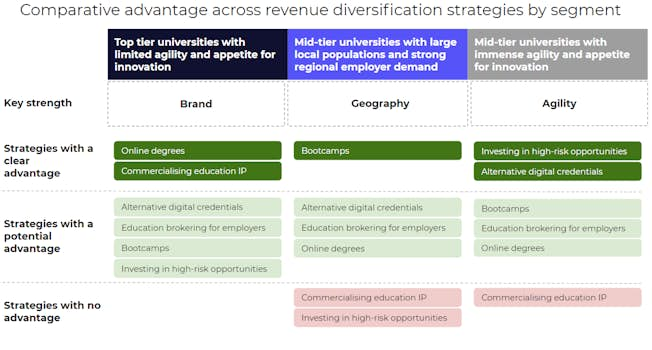In a hyper-connected digital age, professionals across industries are looking for new ways to acquire relevant skills and showcase their value to employers.
As a result, alternative credentials including badges, certificates, and micro-credentials have seen an enormous rise in popularity due to their accessibility, flexibility and demonstrable practical value.
With digital transformation changing how people learn, work, and communicate, non-traditional credentials offer people a way to master skills in niche areas of expertise.
In this article, we explore five key ways that alternative credentials can drive success in universities and colleges.
1) Alternative Credentials Drive Employment Opportunities
Covid-19 turned many sectors and businesses upside down as bricks and mortar options were no longer available due to lockdowns. This accelerated the evolution of digitization meaning that many new jobs will be created, while others will be eliminated.
The World Economic Forum predicts that 75 million U.S workers will need to be reskilled, while globally over one billion people will need new skills by 2030.
By offering an accessible means of expanding on current skill sets and acquiring new qualifications suited to the demands of today’s employers and enterprises, alternative credentials are changing the way that society views education.
While degrees still have their place, we are moving away from traditional learning models and migrating towards the practical, vocational, adaptable arms of alternative credentials. This approach will help close the digital skills gap, boost the economy, enhance profitability, assist development and help people increase their chances of a bright, prosperous career path.
It’s talent and technology that will pave the way for success in the workplace as digital continues to become more important and entrenched across industries.
2) Alternative Credentials Bring Value to the Workplace
Alternative credentials are in huge demand and are continuing to rise as employers across the world report skills shortages in key areas, particularly digital skills. Students and employers crave relevant qualifications to maintain a certain pace and flow in today’s fast-changing and increasingly competitive labor markets.
‘The Rise of Alternative Credentials in Hiring’ report found that people who hold alternative credentials bring value to the workplace, according to executives (87 percent), supervisors (81 percent), and especially HR professionals (90 percent).
For employers, when talent is in short supply, alternative credentials can help uncover untapped talent. The SHRM report found that when employers recognize alternative credentials, it becomes easier for diverse candidates to obtain employment.
These types of credentials also offer value for career development and can be viewed favorably by employers when considering promotions or completing planning activities.

3) Alternative Credentials are More Widely Accessible & Fill a Learning Gap
93 percent of universities and colleges agree that alternative credentials engage populations differently from traditional degree programs, making them more widely accessible according to a UPCEA and MindEdge Learning survey.
The most commonly offered alternative credentials are professional certificates (75 percent), followed by graduate (66 percent) and undergraduate certificates (50 percent).
This enhanced accessibility is particularly important post-pandemic when the number of U.S students enrolled in post-secondary institutions fell by 2.7% in 2021. When compared with 2019, this means there are almost one million fewer students in America’s colleges and universities.
The popularity of alternative certification programs is having a significant impact on teaching and learning. But it is also providing a lifeline for many universities and colleges as a new way to attract students and tap into a market of professionals who left their jobs in search of a new career or new opportunities as part of ‘The Great Resignation’.
4) Alternative Credentials Can Drive Revenue
According to a recent study, the global alternative credentials market for higher education is expected to grow by $1.8 billion at a CAGR of 17% by 2024.
So, alternative credentials are growing at a significant rate with a clear-cut level of value that transcends the industrial spectrum. The table below shows the potential revenue streams for top and mid-tier universities and colleges over graduate and undergraduate programs. As you can see alternative credentials offer a clear or potential advantage for each segment.

The likes of digital badges and certifications play a critical role in helping employers to identify the skills of potential employees - and as alternative credentials become more recognized in the professional world, their value can only increase.
Moreover, in the face of the increased use of digital technologies such as blockchain, artificial intelligence, and machine learning, key job roles are yet to be developed for 2030. Alternative credentials have the potential to provide accessible training in key areas.
5) Help Create Defined Learning Paths
Alternative credentials help people to boost their skills in specific areas of expertise with ease and affordability. Not only do they create viable paths to employment but it offers a learning model that fits around people’s busy lives in a sustainable way.
As the way of working has moved away from the 9 to 5, people can work and learn in different ways. Alternative credentials provide an ideal solution for many individuals to obtain the skills and knowledge they need quickly so they can be applied to a work environment.
This offers people a way to upskill in previously unattainable areas or were seen as unessential. For example, take digital marketing, it now permeates businesses and is a way to cultivate a presence online across industries. It’s a skill that is valued by employers and constantly changes so requires continuous upskilling to stay on top.
As an educator, offering credentials can help you offer:
- Personalized and self-directed learning opportunities
- A focus on the needs of educators, students and businesses
- Competency-based and professionally recognized qualifications
- Practical, rapidly-evolving educational solutions aimed at real-world scenarios and strategy
How Can You Integrate Alternative Credentials into a Strategy?
As the professional world migrates towards a knowledge-based economy, colleges, universities and training providers can set the tone on how alternative credentials can meet the needs of students, workers, and employers - appealing to a broad and valuable range of prospective students.
The best way to integrate these types of credentials into your strategy is:
- Understand your audience - The needs of today’s students have changed with employability being a huge driver in seeking education. Get to grips with your current and prospective students so you know how to approach them and what to offer.
- Know the needs of employers - Employers are calling out for skilled staff and current knowledge. It’s crucial to align your alternative credentials offerings with job market needs. So do your research and see what job trends are important in 2022 and beyond.
- Review and revise content annually - The advantage of an alternative credential is that it is focused and bite-sized so you should update it on an annual or even six-month basis depending on the subject (e.g. if a social media algorithm is updated, your content should reflect that).
- Consider partnerships - There are great learning providers out there that specialize in courses that can be offered as a stand-alone or added to a degree course. A partnership with an industry-aligned provider can mean that someone else takes care of the curriculum and you can offer value to your students.
Learn about DMI University Partnership Program
- Understand how to market - The needs and goals of a cohort looking for alternative credentials are different from the ‘traditional student’ you may be used to. Make sure to create a brand identity that speaks to these students and leverage content marketing and social media to reach them.
If you’re looking for tips on how to engage prospective students, read our blogs ‘6 Shining Examples of Educators Using social Media’ and ‘Educators - The Essential Guide to Content Strategy’.
As we mentioned partnerships, let’s look at a great example. St. Mary’s University of Minnesota was looking to provide an online digital marketing certificate that met the needs of its students (past, present, and future). In partnership with DMI, the university offers three credentials at once (one from St. Mary’s, DMI’s CDMP & AMA’s PCM credentials), giving students the chance to graduate with an industry-accredited qualification.
This trio of credentials helps upskill graduates, equipping them with the latest industry marketing skills and knowledge, and helps them stand out from the crowd to future employers.
Corporate Adoption of Alternative Credentials - SAP
By their nature, alternative credentials are focused, flexible and universally appealing, making them ideal for working professionals. As a result, more corporates are becoming interested in offering alternative credentials to staff members at all levels to standardize skills across a business.
Global software and technology leader, SAP wanted to focus on increasing the capabilities of its marketing department to accelerate digital transformation. To do this the company wanted to embed the skillsets required into the organization through their people and teams.
The project involved over 300 SAP employees becoming Digital Marketing Institute members, first completing a self-led assessment of their digital skills through the Digital Diagnostic. Once their skills levels were established staff enrolled in one of the DMI’s Pro or Specialist certifications.
The result? On completing the online certifications, exam results were analyzed to reveal marked improvements across each module from 4 percent to 135 percent with the largest increase in digital strategy. There was a 52 percent increase in the overall team score.
"I loved how all the content is put together and presented. It is easy to follow and learn. I also loved the accessibility… anytime, anywhere, and from any device!" - Denis Thomas, Sr. Marketing Manager at SAP Spain
Make offering alternative credentials to your students simple
It can be a challenge to keep up-to-date with developments in digital marketing due to the pace of change. Add value to your portfolio by offering industry-aligned digital marketing credentials that are developed in tandem with industry leaders. Partner with us today to provide students with relevant professional skills that will make them highly employable.
- Categories:
- Articles
Upgrade to Power Membership to continue
your access to thousands of articles, toolkits, podcasts, lessons and much much more.
Become a Power Member- Login
- View Courses
- - - -
- Courses
- Resources
- - - -
- My Account
- Change Password
- Logout




